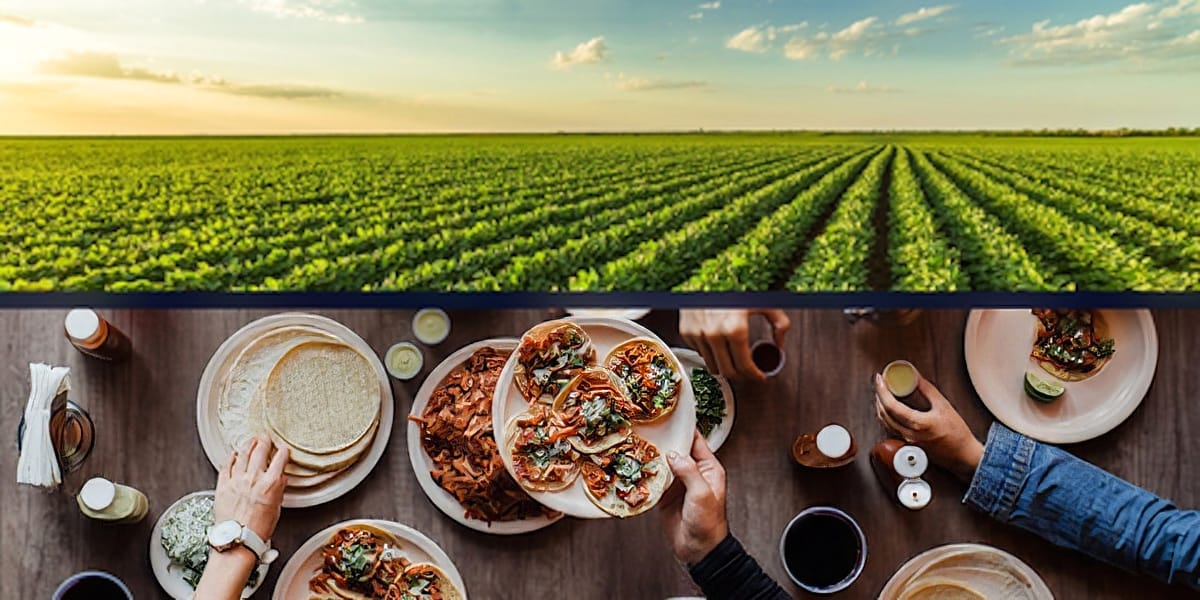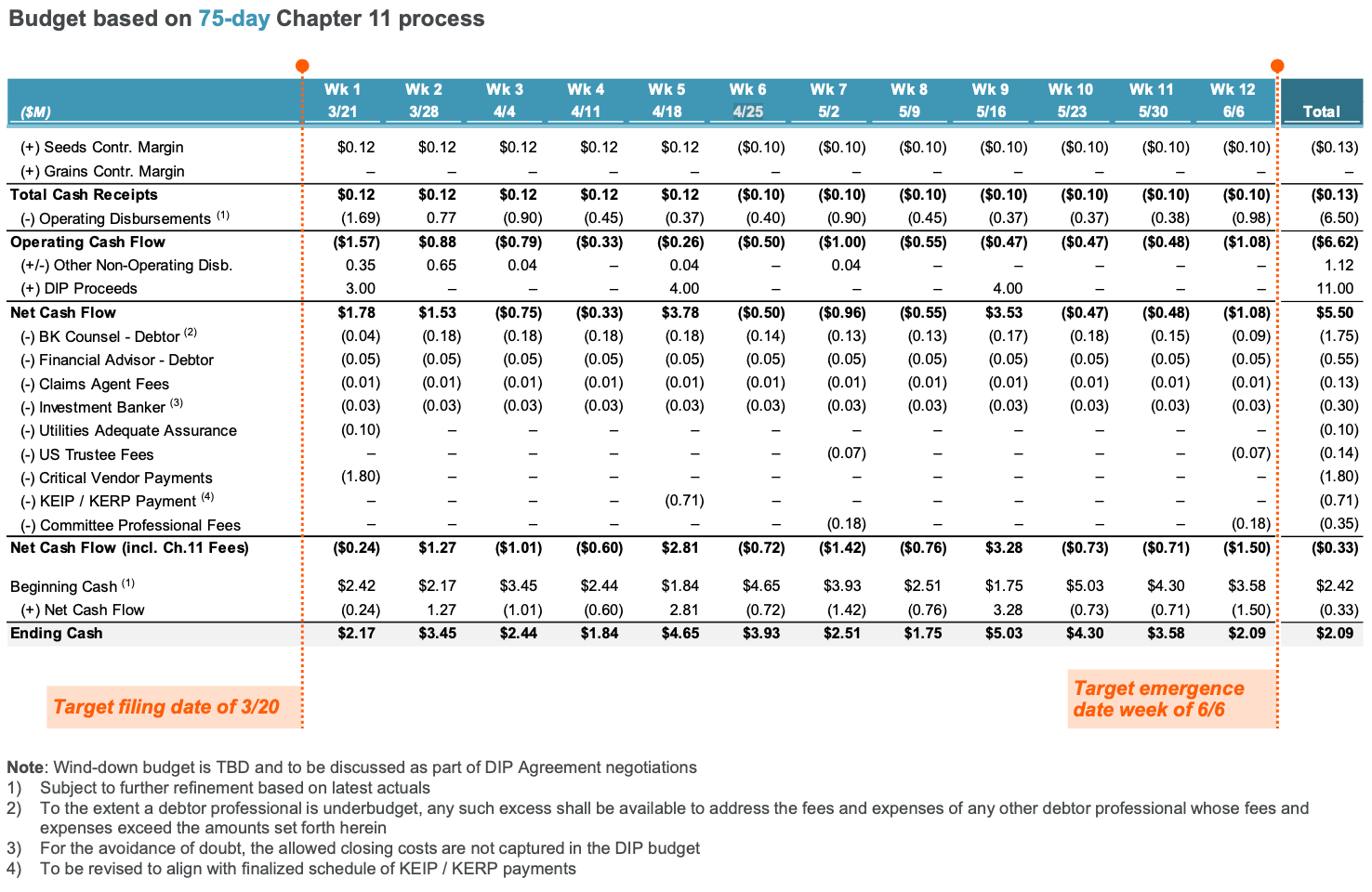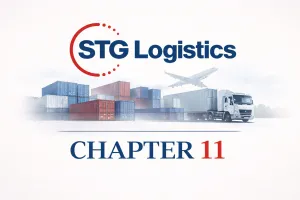Case Summary: Benson Hill Chapter 11
Benson Hill has filed for Chapter 11 bankruptcy amid industry headwinds, seeks going-concern 363 sale backed by DIP financing from existing stakeholders.

Business Description
Headquartered in St. Louis, MO, Benson Hill, Inc. ("Benson Hill") along with its affiliated Debtors⁽¹⁾ (collectively, the “Company” or the “Debtors”), is an agricultural technology firm focused on developing enhanced soybean varieties using its proprietary AI-driven CropOS® platform and Crop Accelerator R&D facility.
- The Company leverages data science, machine learning, and plant biology to accelerate breeding cycles and develop seeds with improved nutritional profiles, differentiating itself from traditional yield-focused seed companies.
- Its primary commercial focus is on Ultra-High Protein, Low-Oligosaccharide (UHP-LO) non-GMO soybeans, designed to yield protein-dense meal for animal feed and ingredients for the plant-based food sector, reducing downstream processing needs.
- The Company also develops soybean varieties tailored for other end uses, including those with high oleic oil content (for renewable biofuels or cooking oil) and low oligosaccharides (for improved animal gut health).
Benson Hill targets the "Better Feed, Better Food, and Better Fuel" markets (detailed below). Key relationships include feed trials with Tyson Foods and a strategic partnership with Archer Daniels Midland ("ADM") to commercialize UHP soy ingredients for the North American food market.
Initially operating an integrated "closed-loop" model, Benson Hill shifted to an asset-light, partnership-based strategy, focusing on seed innovation and licensing while relying on partners for cultivation, processing, and distribution.
The Debtors filed for Chapter 11 protection on Mar. 20 in the U.S. Bankruptcy Court for the District of Delaware. As of the Petition Date, the Debtors reported $137.5 million in assets and $110.7 million in liabilities.
⁽¹⁾ For a complete list of debtor entities, see the organizational structure chart below.
Corporate History
Founded in 2012, Benson Hill raised significant venture capital, including rounds led by GV (formerly Google Ventures) and totaling over $240 million by 2020, to develop its CropOS® platform and proprietary germplasm.
Venture Funding
- Series A ($7.3M, 2015): Funded advancements in genomics and trait discovery.
- Series B ($25M, 2017): Co-led by Lewis & Clark Ventures and Prelude Ventures, supporting further R&D.
- Series C ($60M, 2018): Led by GV, signaling confidence from the tech industry in Benson Hill's AI-driven approach. Other investors included Activant Capital and Tao Capital.
- Series D ($150M, 2020): Backed by existing investors like Wheatsheaf Group and GV, this significant funding round aimed to scale the business and prepare for a public listing.
SPAC Merger and Expansion
- In September 2021, Benson Hill went public via a SPAC merger with Star Peak Corp II, valuing the entity at ~$1.35 billion and providing ~$625 million gross proceeds (including a PIPE backed by BlackRock, Post Holdings, and others). The Company began trading as "BHIL" on Nasdaq.
- Using SPAC proceeds, Benson Hill acquired processing assets: a soybean crush facility in Seymour, IN (Sept 2021), food-grade soy processor ZFS Creston, IA ($102M, Jan 2022, funded by debt), and pea processor Dakota Ingredients (Mar 2021), building a vertically integrated model.
Commercialization and Pivot
- Launched first commercial UHP soybean varieties in 2021 and opened its Crop Accelerator R&D hub.
- Secured a key licensing partnership with ADM in August 2022, validating its technology and enabling a shift towards a capital-light model.
- Faced mounting losses (>$100M in 2022), debt pressures, and a collapsing stock price, prompting a "Liquidity Improvement Plan" in March 2023.
Restructuring and Pre-Petition
- Divested non-core "Fresh" unit ($21M, Jan 2023), Seymour ($36M, Oct 2023), Creston ($72M, Feb 2024), and Dakota Dry Bean ($23M, Feb 2025), using proceeds primarily to retire debt.
- Executed significant workforce reductions (~30% in 2023) and replaced CEO Matt Crisp with interim CEO Deanie Elsner (June 2023).
- Attempted a sale process in 2024, including an unsolicited bid from Argonautic Ventures (~$8.60/share post-split) that failed to materialize.
- Executed a 1-for-35 reverse stock split (July 2024) and consolidated HQ into the R&D facility (early 2025).
- By early 2025, the Company had no secured debt but was critically low on cash, leading to the Chapter 11 filing.
Organizational Structure

Operations Overview

Benson Hill targets three primary markets: Better Feed, Better Food, and Better Fuel.
- Animal Nutrition: The Company serves poultry (broiler, layer, turkey), swine, and pet food producers seeking protein-dense, energy-rich feed inputs. Trials, including a partnership with Tyson Foods, indicated UHP-LO soybean meal offered equivalent animal performance to conventional meal while potentially lowering feed costs due to higher protein and energy content, allowing for reduced usage of supplemental fat and protein.
- Human Food: Ingredients support the plant-based protein and alternative meat markets. A long-term partnership with ADM aims to scale novel soy ingredients (flours, concentrates, textured proteins) for applications like vegetarian meat analogues and dairy alternatives.
- Fuel Sector: Soybeans with improved oil or protein profiles can serve as renewable biofuel feedstocks.
Key Assets & Model
Following its strategic pivot to an asset-light model, Benson Hill's operations center on its intellectual property and R&D capabilities, leveraging partnerships for commercial scale.
- St. Louis R&D Hub: An owned/leased 47,000 sq. ft. facility housing the Crop Accelerator and corporate HQ.
- Intellectual Property: Core value resides in the CropOS® platform, proprietary soybean germplasm, and 245 pending or issued patents.
- Asset-Light Model: Focuses on seed/trait innovation and licensing genetics to partners for cultivation (farmers), processing (e.g., White River Soy Processing, which acquired the Seymour & Creston plants), and commercialization (e.g., ADM for food, feed companies like Tyson).
Workforce and Leadership
- As of the Petition Date, Benson Hill directly employed 108 full-time employees, primarily consisting of research scientists, product developers, agricultural engineers, and administrative staff. Post-filing workforce restructuring will reduce this number to 71 full-time employees.
- At filing (March 2025), Chief Administrative Officer Daniel Cosgrove was appointed interim CEO, replacing Deanie Elsner.
Key Partnerships
- ADM: Strategic partner for processing and commercializing UHP soy ingredients for the North American human food market under a co-branding arrangement.
- Tyson Foods: Collaborated on successful broiler feed trials using Benson Hill's UHP soy meal, demonstrating potential cost savings and performance benefits. Discussions with other poultry integrators were also underway.
- White River Soy Processing: Operates the divested Seymour and Creston facilities, processing Benson Hill's proprietary soybeans under grain supply and licensing agreements.
- Investors/DIP Lenders: Key venture backers like S2G Ventures and affiliates remain involved, providing DIP financing and potentially positioning themselves as bidders in the sale process.
- Other Potential Partners: Ongoing discussions targeted pet food manufacturers and independent seed companies for licensing or co-development opportunities.
Events Leading to Bankruptcy
Financial Pressures
- Debt Burden: High-cost debt from the Creston acquisition drained cash before being retired via asset sales in early 2024.
- Persistent Losses: Consistent net losses (e.g., $22.9M in Q3 2024) eroded capital post-SPAC.
- Stock Collapse & Liquidity Crisis: Share price decline blocked equity access; asset sales and cost cuts were insufficient to prevent cash depletion by early 2025.
Operational & Market Challenges
- Integrated Model Costs: Operating acquired processing plants proved capital-intensive and complex.
- Pivot Execution: Transitioning to asset-light incurred costs and consumed proceeds needed for operations.
- Market Headwinds: Slowing plant-based food growth, commodity volatility, and lengthy agtech adoption cycles hampered revenue generation.
Failed Sale Process
- A year-long effort to sell the Company, including engaging with an unsolicited bid from Argonautic Ventures (LOI signed Aug 2024), failed due to financing challenges and lack of definitive agreements.
Pre-Petition Steps & Chapter 11 Filing
- Completed final major asset sale (Dakota Dry Bean, Feb 2025).
- Engaged Piper Sandler (IB) and Faegre Drinker (legal) for restructuring.
- Secured ~$11 million in DIP financing from existing stakeholders, granting them potential stalking horse rights.
- On March 20, 2025, Benson Hill filed for Chapter 11 in the District of Delaware, reporting assets of $137.5 million and liabilities of $110.7 million, primarily unsecured trade/contract claims.
- The Company intends to pursue an expedited Section 363 sale process targeting a going-concern transaction to maximize the value of its technology and partnerships.
Initial DIP Budget

Stay informed on every Chapter 11 bankruptcy case with liabilities exceeding $10 million. Subscribe for free to have our coverage delivered directly to your inbox, and explore our full archive of past summaries.
If you’re already a subscriber and would like to receive timely filing alerts, please reach out and we’ll add you to the distribution list.



